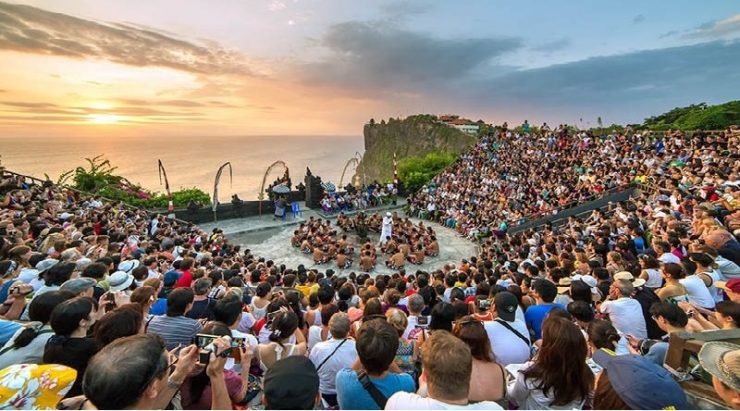THE COVID-19 pandemic affected the social and economic lives of people worldwide. One of the economic sectors hampered by the pandemic was tourism since restrictions implemented to control COVID-19 transmission limited people’s activities and mobility.
Regions whose economies depended on tourism, such as Bali, experienced a hard time, with some businesses in tourism even closing down. In fact, according to Indonesia’s Tourism and Creative Economy Minister, Sandiaga Uno, Bali is the second-largest contributor of foreign exchange to Indonesia after oil and gas.
“The province accounts for 50% of the foreign exchange earnings in tourism, which reach around US$20 billion per year. Given the big role of Bali in Indonesia’s tourism, several efforts have been made by the government to revive the tourism sector in Bali, starting from providing travel incentives, increasing travel programs, and opening gates to domestic and foreign tourists,” he said.
Meanwhile Director-General of the World Health Organization (WHO) Tedros Adanom Ghebreyesus recently scrapped the global health emergency status of COVID-19, after nearly 3.5 years.
Momentum for revival
The revocation of the global health emergency status of COVID-19 has become an opportunity for the revival of Bali’s tourism. Based on Statistics Indonesia (BPS) of Bali’s records, in 2020, the province’s economy experienced a severe economic contraction of minus 9.31% – the lowest growth among provinces in Indonesia.
Then, slowly, Bali’s economy improved in 2021, even though its growth was still at minus 2.47%. In 2022, Bali’s economy recorded positive growth of 4.84%.
An economic observer from the National Education University (Undiknas) of Denpasar Ida Bagus Raka Suardana expressed optimism that tourism in Bali will grow significantly after the good news from the WHO.
There are several steps that are needed to support the revival of Bali’s tourism, such as the dissemination of information and promotion to attract quality tourists, among others.
Tourists who spend more money will benefit Bali’s tourism. One of the ways to attract quality tourists is increasing MICE or Meetings, Incentives, Conventions, and Exhibitions tourism.
MICE tourism is considered to be higher in terms of quality compared to mass tourism, which, even though it draws many tourists, is not yet balanced with significant spending.
In the long-term, increasing the cost of the visa on arrival (VoA) scheme and the retribution fee on foreign tourists visiting Bali are also some steps that can be taken to push quality tourism.
Based on the immigration office’s website, the cost of a visa on arrival is IDR500.000 (around US$ 33.68), which can be paid in US dollars or rupiah. As of April 2023, as many as 92 countries have been extended the VoA facility by Indonesia.
Likewise Director of the Center of Economic and Law Studies (Celios) Bhima Yudhistira said that apart from the quality of tourists, regional governments and tourism business actors need to ensure infrastructure development so as to be well-prepared in welcoming tourists.
Then, stakeholders also need to increase the number of direct flights, tourism promotions, and international events that can present higher foreign exchange, for example, exhibitions and music events.
What is also important is the role of Indonesia’s representatives abroad, such as embassies, in carrying out tourism promotions. Apart from that, maintaining security and comfort in the area is also needed as tourism requires a conducive environment to develop.
Quota for tourists
The Bali provincial government is currently preparing a regional regulation on imposing a quota for foreign tourist arrivals, which is aimed at attracting quality tourists.
According to Governor of Bali Wayan Koster, tourism control is aimed at preventing mass tourism, as seen recently. To this end, a quota system will be imposed on foreign tourists visiting Bali. In 2019, that is before the COVID-19 pandemic, the number of foreign tourists visiting Bali reached 6.3 million.
The Bali government has signaled that the regulation will cover several things, including a limit on the foreign tourist quota and a minimum amount of funds foreign tourists will be required to have in their savings accounts before they fly to Bali.
The regulation will not limit the nationality of tourists, but will be more specific about the total number of arrivals. The plan to impose a foreign tourist quota in Bali has been proposed as a solution for promoting quality tourism and tackling the phenomenon of disruptive tourists and tourists who violate the law.
The Regional Office of the Ministry of Law and Human Rights of Bali province has also expressed support for quality tourism in Bali.
The Office’s Head Anggiat Napitupulu has also taken firm action against disruptive foreign tourists, such as those who violated the law and showed a lack of respect for the culture and local wisdom of Bali, in the form of deportation.
Together with other institutions in the Foreigner Supervision Team, the Ministry of Law and Human Rights has also carried out the screening of disruptive tourists.
From January to April 2023, the immigration office in Bali deported 101 foreign nationals due to diverse problems, such as overstaying and violating norms in Indonesia, especially Bali. Since Bali reopened its gates to international tourists from May 2022 to December 2022, as many as 194 foreign nationals have been deported.
Based on the records of the Regional Office of the Ministry of Law and Human Rights of Bali province, the highest number of foreign nationals who were deported were of Russian nationality. The deported tourists also included Nigerians, Ukrainians, and Japanese nationals.
Encouraging tourism of better quality in Bali is not impossible, especially supported by the revocation of the COVID-19 global health emergency status. What is most important now is realizing quality tourism, which cannot be done by the Bali government alone, but will need support and commitment from all parties, including the community. [antaranews/photo special]
















